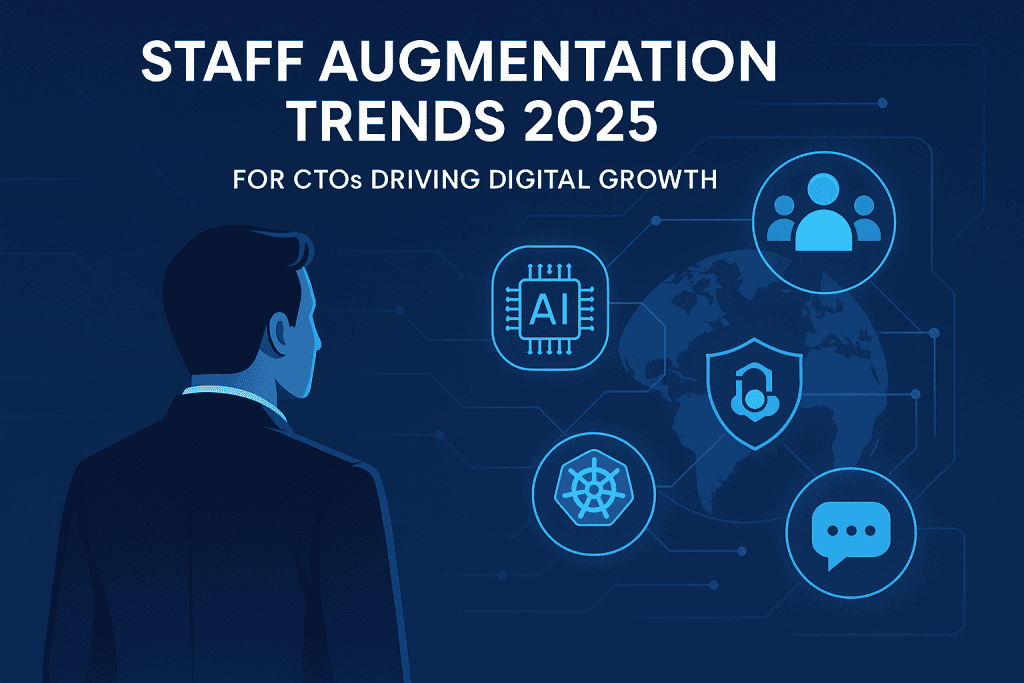
As technology continues to evolve at lightning speed, so do the talent needs of today’s organizations.
CTOs increasingly depend on technical staffing agencies to help their organizations quickly change and
expand their operations. The year 2025 will bring staff augmentation to a strategic peak through three
major trends that include workforce expectations evolution, technology specialization, and global hiring
models. All CTOs need to track these key points.
Shift Toward Outcome-Based Staff Augmentation
One of the most significant developments in 2025 is the move from time-based contracts to outcome-
based engagements. Staffing partners no longer receive evaluations based on filling job positions but
must demonstrate their ability to achieve project deliverables and meet outcome requirements. The
new performance-based approach leads CTOs to trust external talent more while they evaluate ROI.
Outcome-based models are particularly effective for short-term, high-impact projects such as cloud
migrations, cybersecurity audits, and product MVP development. The method enables staff
augmentation providers to assume more responsibility for project delivery schedules and quality
standards.
Integration of AI in Talent Matching
AI is having a major impact on how IT staffing companies source and match candidates to client needs.
In 2025, advanced algorithms are being used not just for skill alignment, but also for assessing cultural
fit, adaptability and likelihood of long-term success. The process leads to quicker recruitment and
improved maintenance of augmented workforce personnel.
The application of predictive analytics by providers now enables CTOs to use team composition data for
better data-driven hiring choices. By leveraging these AI-driven tools, companies can minimize
downtime and get the right people into roles faster than ever before.
Emphasis on Niche Tech Skills
Generic tech skills are no longer enough. As more businesses adopt emerging technologies like Web3,
machine learning, and edge computing, staffing vendors are placing greater emphasis on niche
expertise. Companies require specialists who understand Rust, Kubernetes, and blockchain frameworks
because these professionals remain scarce in the job market.
CTOs need to select partners who excel at finding and delivering skilled professionals in highly
specialized domains. The worldwide talent reach of augmentation providers enables them to secure
specialized skills that are hard to find in the market.
Hybrid and Remote-First Augmentation Models
The remote work era has changed how companies view staffing. The year 2025 strengthens the
preference for hybrid and remote-first augmentation models. This flexibility not only broadens access to
talent beyond local geographies but also supports cost efficiency and talent diversity.
Staff augmentation companies currently provide remote professionals who possess training in
asynchronous work processes, distributed agile methodologies, and secure collaboration tools. CTOs can
achieve quicker remote hire transition and better remote team integration through this approach while
maintaining productivity levels.
Rising Focus on Soft Skills and Team Dynamics
While technical ability remains crucial, soft skills like communication, problem-solving, and collaboration
are becoming equally important. Current development teams find success through teamwork, especially
in agile environments that need cross-team collaboration.
Technical staffing agencies now evaluate candidates for their soft skills because they understand that
complete team integration demands skills beyond technical expertise. The broader approach to
candidate assessment enables CTOs to minimize workplace conflicts and create better chances for
sustained success through augmented staff.
Conclusion
The staff augmentation landscape is transforming in response to evolving tech needs, global hiring
trends, and the demand for higher agility. CTOs who wish to lead in 2025 need to monitor these industry
shifts while partnering with staffing firms that provide services beyond resume delivery. IT staffing firms
bring their role as strategic partners to digital transformation objectives by using AI capabilities for
talent matching and providing access to specialized skills and remote-capable professionals.
